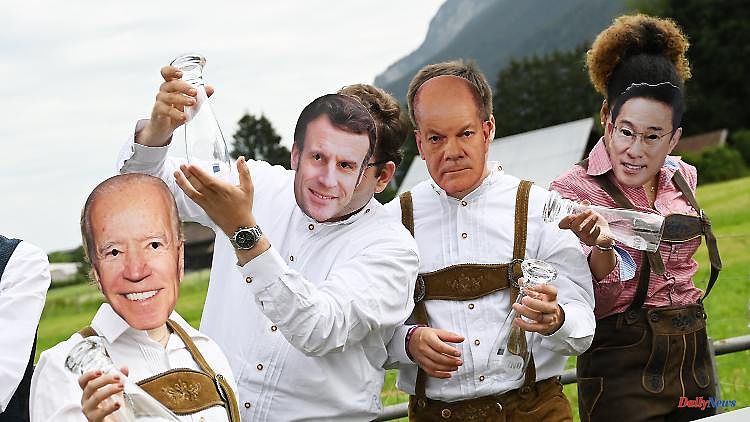While the Munich police are expecting the Black Bloc to attend the major anti-G7 demo, the organizers of an alternative summit are relying on arguments. A protest camp is set up in Garmisch-Partenkirchen. The residents count the days until the "spook" is over.
Critics of the forthcoming G7 summit at Schloss Elmau have accused the seven leading western economies of sharing responsibility for global crises and injustice at an alternative summit. The wealth of the G7 nations is based on the exploitation of the Global South, said the political officer of the alliance erlassjahr.de, Malina Stutz, in Munich. "We don't want to continue to accept that."
The alliance is committed to independent insolvency proceedings for over-indebted states. "Progress for a just world" is the alleged goal of the G7 summit, the organizers of the event announced in advance. The participating states would often block necessary reforms "for reasons of national and economic power interests". "You could do it all differently," said Julia Thrul of Oxfam Germany. "You just have to have the courage to imagine it." Among other things, the organization calls for a special tax to combat inequality.
Several organizations and associations had invited to the alternative summit, including Attac, Oxfam, the Alliance for Fair World Trade and the Rosa Luxemburg Foundation. At the same time, solutions for a more just world should also be discussed. The G7 meeting will take place for the second time from June 26th to 28th at Schloss Elmau at the foot of the Wetterstein Mountains. The G7 had already met in the alpine luxury hotel in 2015. The group includes Germany, Great Britain, France, Italy, the USA, Canada and Japan.
For the mayor of Garmisch-Partenkirchen, Elisabeth Koch, the burdens on citizens from the G7 summit are currently "close to the tolerance limit". The high police presence should ensure the peaceful course of the meeting - that benefits the citizens, said the CSU politician. In order to support this goal in the best possible way, all available parking spaces for the police and rescue services would have to be kept free more or less in the short term. In a week the "spook will be over".
Meanwhile, critics of the Elmauer summit began setting up their protest camp on a meadow on the Loisach in Garmisch. Around 750 people could camp here on summit days, with more if necessary, said the camp's declarant, York Runte. Around 30 activists were busy setting up the camp in the morning, and dozens of police officers stood at the entrances to the camp. Cooperation with the police works well, said Runte. It is still unclear whether and how there will be a demonstration near the Schloss Elmau conference venue. "Being shuttled there with police buses has nothing at all to do with the right to assembly," Runte criticized a proposal currently under discussion. At least you want to go there in your own bus.
According to police estimates, more than the 20,000 registered participants could come to the large demonstration against the G7 summit on Saturday in Munich if the weather is good. He also expects a black block, said Munich's operations manager and police vice president Michael Dibowski at the presentation of the police operation concept on Thursday in Munich. Around 3,000 police officers are to ensure a peaceful process. A total of around 18,000 officials are deployed around the summit.












